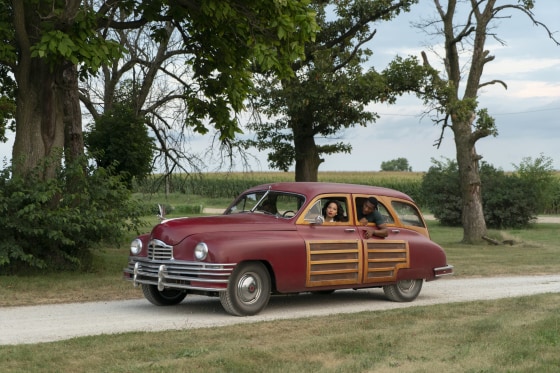HBO's new series "Lovecraft Country" is not a great series, but, precisely for that reason, it is quietly groundbreaking. The 2017 movie "Get Out," 2018's "Black Panther," and last year's "Watchmen" television series were sweeping efforts to bring Black, anti-racist, speculative fiction into the public consciousness — they were, self-consciously, events. "Lovecraft Country" is less ambitious, but it's not necessarily less important. The series is a sign that science fiction and fantasy starring Black leads and featuring anti-racist themes is becoming normalized in mainstream television and film.
HBO's new series "Lovecraft Country" is not a great series, but, precisely for that reason, it is quietly groundbreaking.
"Lovecraft Country" is set in 1950s Chicago, where Atticus (Jonathan Majors), learns he is the descendent of the Braithwaites, a family of white wizards who summon various evils like Shoggoths inspired loosely by the works of prolific cosmic horror author H.P. Lovecraft. Atticus and his family and friends end up fighting demons, ghosts, potion-toting mad scientists and power-mad white people.
The series is based on a 2016 book of the same name by Matt Ruff. The novel is a deliberately and ironically low-key affair, which juxtaposes Lovecraft's pulp cosmic horrors with the everyday cruelties of racism: police terrorizing motorists for driving while Black, the Tulsa Race Massacre, housing discrimination, employment discrimination. Lovecraft, a vicious racist, created a mythology in which the universe was filled with degenerate, slavering inhuman monsters from outside space and time, all determined to blot out (white) life.
As Black people, though, Ruff's characters are used to facing a bleak and hostile universe, and the white sorcerers and policeman they face consistently underestimate their intelligence, their resilience and their familiarity with horror and science-fiction tropes. "What is it you're trying to scare me with?" Atticus asks, laughing. "You think I don't know what country I live in?" The book has a wry wisdom, and a flare for inventive anticlimax.
Wit and anticlimax aren't exactly the formula for HBO action series, though, and the show creators, including developer Misha Green and executive producers Jordan Peele and J.J. Abrams, opted for a very different tone. Specifically, based on the five of 10 episodes available for review, they added a lot more violence and a lot more sex to spice things up.
Atticus, a level-headed, science-fiction geek who thinks his way out of most problems in the original book, becomes a volatile man of action with a hair-trigger temper. He and female lead Letitia Lewis (Jurnee Smollett) are given a steamy, sex-on-various-available-surfaces romance, in the HBO tradition. Monster battles take place on screen rather than quietly off to the side of the page. Amusingly negotiated truces with mystical forces are inevitably transformed into more standard-issue, FX-laden blowouts.
More sex and violence can be fun. But the result of HBO-ifying Ruff's novel is, unfortunately, a mess. The added interpersonal conflict between characters often feels unmotivated, while Ruff's careful, interlinking plot is turned into a confused sprint from one exciting twist to the next. One marginalized character is disposed of so quickly, and so casually, as to feel offensive. Mostly, though, the show just seems to be spinning its wheels, or its tentacles, as the case may be.
This isn't to say "Lovecraft Country" is terrible. Smollett is great fun to watch. Wunmi Mosaku is even better as Ruby Baptiste, a woman who has always had to take "no" for an answer but is suddenly offered everything she wants — if she can figure out what that is. She's fierce, vulnerable and exasperated by turns, and makes it all feel natural and true despite a goofy plot and wavering script. Also, she gets to sing some badass blues and early rock, which is just about worth the price of admission in itself.
There's undeniable pleasure in watching Black protagonists overcome white supremacy in general, and Lovecraft's monsters in particular.
There's also undeniable pleasure in watching Black protagonists overcome white supremacy in general, and Lovecraft's monsters in particular. H.P. would hate this show with every fiber of his being. It's pleasing to imagine the horror of that old racist as a bunch of talented Black artists wreak bloody vengeance on his monstrosities.
In the end, though, "Lovecraft Country" is simply not great. It's not even really trying for great. "Black Panther" was consciously upending the whiteness of the Marvel Cinematic Universe. "Watchmen" was similarly taking on, and rewriting, the whiteness of Superman and the DC comics universe. "Get Out" showed how Black experience could be at the center of the horror genre. They all meant, in different ways, to use anti-racism to change everything.
"Lovecraft Country" sets its sights lower, in part because it can. It feels like there's been a tipping point in speculative fiction, where Black characters and anti-racist themes are, if not the norm, at least a norm, with a reliable critical and commercial audience. A lot of genre product starring white people — like, say, "Extraction" — is solidly, predictably mediocre or worse. A more equitable media landscape will have room not just for groundbreaking works like "Get Out" or "Black Panther," but also for decent to middling Black speculative fiction like "Lovecraft Country."


